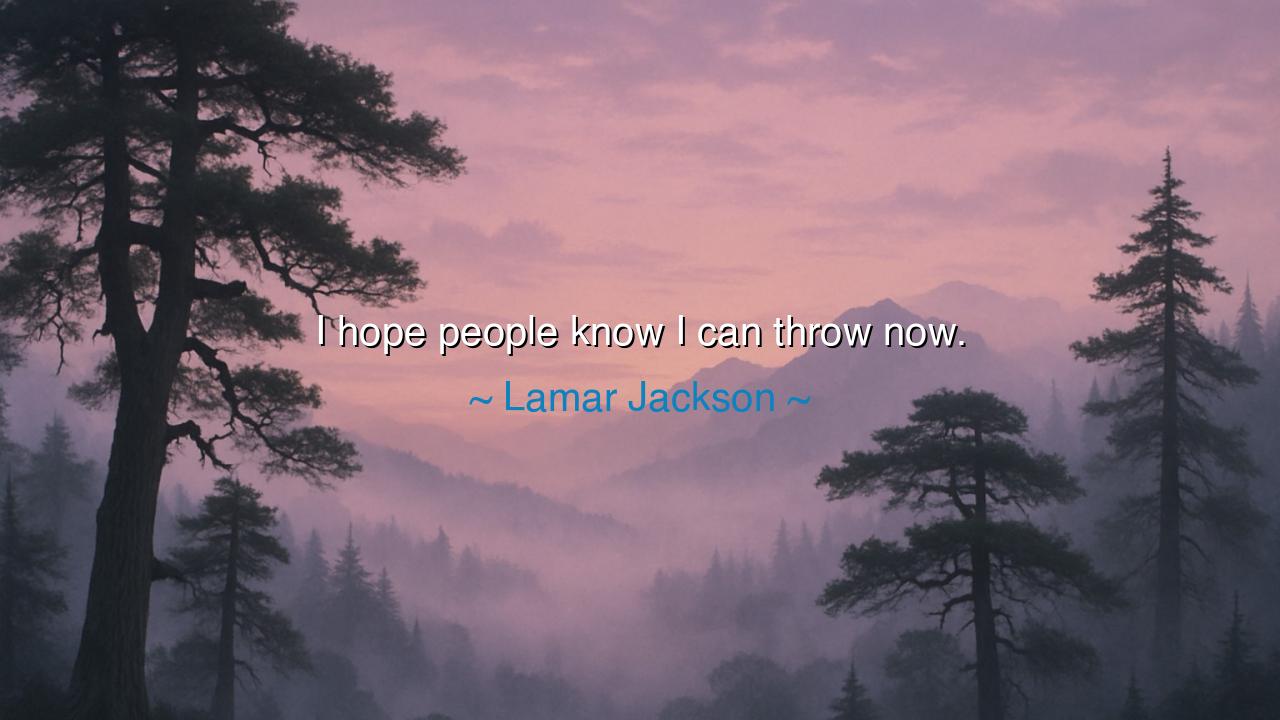
I hope people know I can throw now.






“I hope people know I can throw now.” — thus spoke Lamar Jackson, a man forged by doubt and crowned by perseverance. His words, though simple in sound, echo with the thunder of defiance and the quiet dignity of one who has endured misunderstanding. They are not merely the boast of an athlete, but the declaration of a soul long underestimated — a warrior reminding the world that he is more than what they said he could be. Within this humble yet powerful utterance lies an ancient truth: that every person must one day rise to prove their worth, not through arrogance, but through mastery of their gift.
In the early days of his journey, Lamar Jackson was hailed for his feet but doubted for his arm. The world saw him as a runner, not a thrower — as a spark of chaos, not a craftsman of precision. Yet he listened, not with bitterness, but with fire. He trained when the lights were gone, refined his mechanics, honed his timing, shaped his will. When at last he stood before the world again, he no longer needed to shout his greatness; he merely smiled and said, “I can throw now.” And in that moment, the doubters fell silent, for ability had spoken where words once failed.
This quote, though born of the modern arena, carries the spirit of the ancients — the eternal story of the underrated warrior. Think of Achilles, whose mother tried to hide him among women to keep him from war; yet destiny could not be disguised. Think of Joan of Arc, mocked by generals until she led armies to victory. Or recall Galileo, condemned for saying that the Earth moves around the Sun — yet truth, like a well-thrown pass, always finds its mark. History remembers these souls not merely for what they accomplished, but for proving what others denied. So too, Lamar’s words join this lineage of vindication — the moment when self-belief becomes undeniable reality.
There is something divine in the act of proving oneself through action. The ancients taught that a man’s virtue is not in his words, but in his deeds. “Let your actions speak louder than the wind,” they said, “and the world will hear you through silence.” Lamar Jackson did not seek vengeance upon his critics; instead, he transformed their doubt into discipline. He became a symbol for all who are told they are not enough — for the dreamer labeled “too small,” the artist deemed “too strange,” the student called “not ready.” His victory was not over others, but over limitation itself.
Yet we must not see this story as mere triumph — it is also a calling. For each of us holds within our spirit a skill, a gift, or a truth that the world may not yet recognize. There will be voices that diminish, discourage, and distort. But the wise do not argue with such voices; they prepare. They build in silence. They sharpen their craft until the day comes when their work speaks for itself. And when that day arrives, they, too, may smile and say, “I can throw now.”
The lesson, then, is clear: let doubt become your forge, not your cage. When the world questions your ability, let it drive you to refinement, not resentment. Do not seek the fleeting satisfaction of proving others wrong, but the lasting joy of becoming who you were meant to be. Greatness, after all, is not bestowed — it is built in secret, earned through sweat, and revealed in due time.
Therefore, children of tomorrow, when you hear the whisper of doubt in your ear, do not tremble. Stand firm. Work in patience and in silence, until your craft is so complete that it needs no defense. For when the day comes that you can say, as Lamar Jackson once did, “I can throw now,” it will not be pride that speaks — but the voice of truth, long prepared, finally set free. And the world, once blind, will see.






AAdministratorAdministrator
Welcome, honored guests. Please leave a comment, we will respond soon